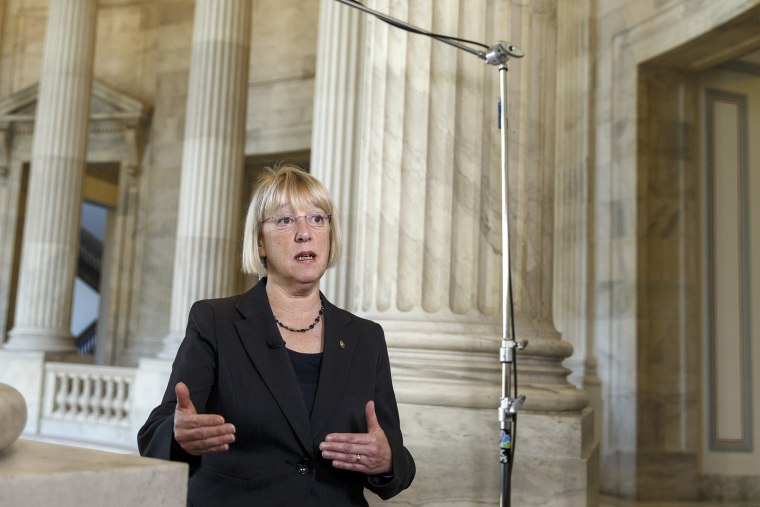They called it the Year of the Woman. In 1992, four women were elected to the U.S. Senate — fueled in part by outrage at the all-male Senate panel that had grilled Anita Hill. Patty Murray of Washington state, famously denigrated as just a "mom in tennis shoes," was one of them. In 2012, that record was broken thanks to Murray, who ran the Democrats' campaign operation, kept the Senate under the party's control against all odds, and brought the the total number of women in the chamber to 20. It wasn't the only time she represented for other women: In 2011, when budget negotiations threatened to shut the government down and House Republicans demanded that Planned Parenthood be defunded, Murray recalled to The Washington Post, “I walked in, and I was literally the only woman ... They said: ‘We’re all done except the House wants one last concession. They want us to give on that and we’re done.’ And I said: ‘Not on my watch. Absolutely not on my watch.’”
That same year, conservative activist Grover Norquist sneered of Murray, "The lady from Washington doesn’t do budgets.” She proved him wrong.
Last week, Murray was in the Supreme Court to hear the arguments in the Hobby Lobby case, in which for-profit corporations are seeking to opt-out of covering birth control on their employee health plans. She talked to msnbc about Clarence Thomas, watching the women on the Court, and the continuing attacks on reproductive rights.
I hear you were in the courtroom for the Hobby Lobby hearing. What did you think?
Yes! I have been here in D.C. since I ran for the Senate many years ago [in 1992], but that was the first time I actually went into the Supreme Court and watched any case. It was an interesting moment for me, because I really ran for the Senate because of watching Clarence Thomas and Anita Hill in Thomas's confirmation hearings, and feeling like no one was saying what I would if I were in the U.S. Senate. So to walk in and see Clarence Thomas sitting there was a wild moment. What was even more compelling for me was when the Hobby Lobby attorney began his argument, it was the women on the Court who immediately asked the questions that I would have asked had I been sitting there.
It said to me that yes, because women had gotten into politics and on the Court, we now have women in the position to ask the questions that need to be asked when something like contraceptive coverage comes up.
And you sat next to Senator Roy Blunt, who in 2012 tried to get through Congress the kind of opt-out of contraceptive coverage that Hobby Lobby wants. Did you talk about that?
[laughs] We did not chat about the case in front of us. We talked about everything but.
It seems to me that Democrats have become more assertive about reproductive rights, whether that's contraceptive coverage or abortion rights. Do you think that's true, and if so why?
I think there are more people willing to stand up and make the case that women should make their own health care decisions. It shouldn’t be the owner or shareholder of the company. It shouldn’t be men sitting in Congress or in state legislatures. This is something that a woman has a right to make a decision about, along with her own family, her own faith, her own personal interests at heart. No one else’s.
You helped recruit some of the Democratic women elected in 2012 that both helped Democrats keep the Senate and brought the number of women in the Senate to a record 20. Does the Senate feel different now?
There is no doubt. There is no committee hearing in the U.S. Senate where there is not a woman present. When women stand up and talk from their perspective, they’re reflecting an important perspective that over half the country shares.
A few of those women are up for reelection this fall. What role do you think gender will play in the midterm elections?
I think women are very compelling to voters. They’re straightforward, they want to get a job done, they really fight hard for what they believe in. And I think voters are looking for that kind of voice in their selection. I feel very good about all the women that are running.
In 2011, you refused to agree to defunding Planned Parenthood, even though House Republicans threatened to shut down the government over it. Do you expect to see that kind of battle again?
Any one of us who thinks this debate is over hasn’t watched what’s happened in the last 10 years. Many of the state legislators are really going beyond the pale in legislation they’re proposing, and in many cases, passing. This debate is as hard fought today as it was 20 or 30 years ago. And if women step back and say, "Well, I’m okay, I can make my own health care decisions," they will allow those voices to prevail. I have no doubt we will see future attempts to take away a woman’s right to make her own health care decisions.
